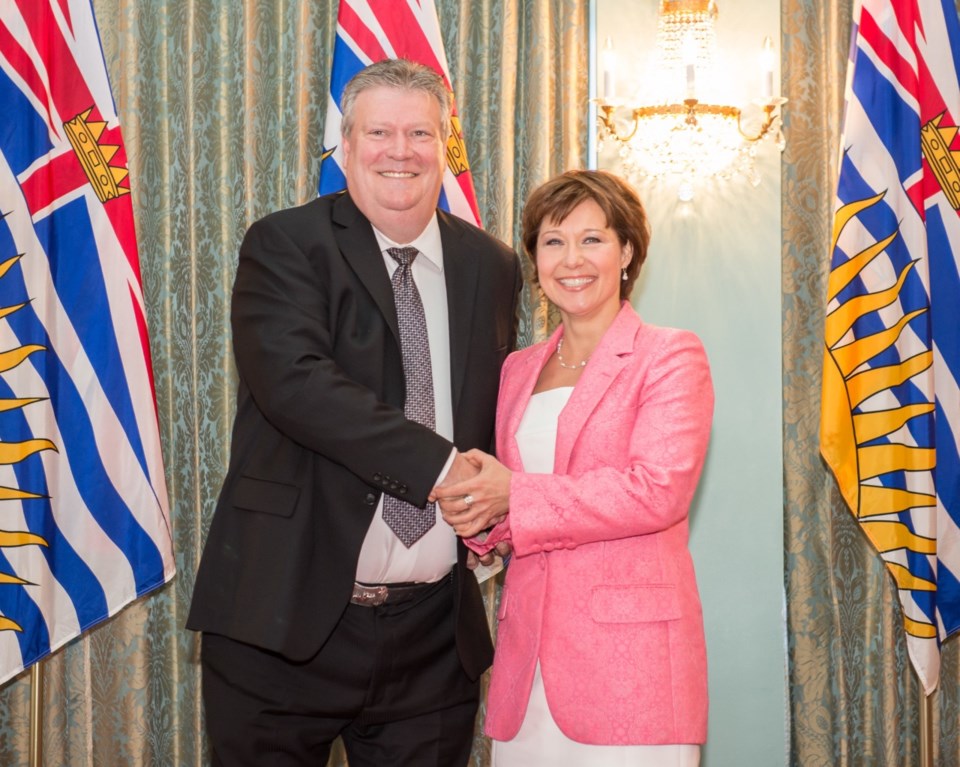Were officials overseeing gambling too focused on revenue and not social responsibility in order to meet then premier Christy Clark’s expectations?
That’s the question put to former B.C. Lottery Corp. (BCLC) CEO Michael Graydon at the Commission of Inquiry into Money Laundering in B.C. Thursday.
Graydon had repeatedly written to BCLC executives warning that if revenue goals were not met, they’d be out as much as 20% of their salaries in lost incentive bonuses.
A December 2011 email suggests Clark struck a new “tone” in government upon her appointment in March 2011.
“The tone in government is not good these days and to not achieve budget then payout incentive will not fly. So remember the consequences you will unleash if you do not participate with some energy through this process.… These are very different times and we have to be responsive to our shareholder,” Graydon told nine executives in the email disclosed to the commission of inquiry.
That sole shareholder is government, and Graydon said it “had more initiatives that they wanted to undertake than they did money, so they counted on the contribution we had agreed to in our budget.
“They were insistent that we deliver on what we had planned and this note is designed to reinforce that.”
But Graydon told the commission his repeated emails on meeting revenue goals for government did not mean his agency was ignoring anti-money laundering (AML) policies – the supposed “dual mandate.”
“The amount of time effort and investment we made in this would indicate we wanted to create a safe regime and if there was no intention or no probability of money laundering then we obviously wouldn’t need [AML] programs. The fact that we were primarily a cash-based business [meant] we were vulnerable to those types of things,” Graydon told commission counsel Patrick McGowan in testimony Thursday.
Graydon, who could not recall many details, said the BCLC had an AML regime and was constantly improving upon it.
Last November, casino investigator Larry Vander Graaf, not unlike others who have testified, asserted BCLC was in a conflict of interest. On the one hand BCLC – which was tasked with managing and conducting gambling, including licensing casinos – had to meet revenue goals for government while at the same time prevent money laundering.
And so, by 2014 the situation had gotten to a point where confusion reigned across BCLC and the Gaming Policy and Enforcement Branch (GPEB) about implementing even elementary measures, such as interviewing gamblers bringing in duffel bags of $20 bills, to determine the source of the cash.
Graydon was CEO between 2008 and 2014. In 2013 his head of security and compliance, Brad Desmarais, and Vander Graaf, executive director of GPEB casino investigations, weren’t on speaking terms. GPEB employees previously described to the commission how the regulator of BCLC was dysfunctional and underfunded.
Meanwhile, the Clark government tasked Graydon with boosting revenues $40 million annually.
McGowan noted to Graydon that there was no communication from him to staff on AML.
Still, Graydon assured the commission BCLC was alert to the issue. In his time BCLC created electronic funds accounts, although they were barely used as they were voluntary.
McGowan questioned Graydon on what ministers responsible for gambling knew about money laundering problems.
He said they were familiar with the $20 bills coming into casinos.
“Did you discuss with each of the ministers or any of them a concern B.C. casinos might be being used to process the proceeds of crime?” asked McGowan.
“Again, I can’t remember if that specific terminology was being utilized but we did communicate regularly on the measures to mitigate risk,” said Graydon.
John van Dongen, Rich Coleman, Shirley Bond and Michael De Jong were the four ministers responsible for BCLC between 2008 and 2014.
Graydon said all the ministers endorsed the AML measures being taken. “Each minster I had the privilege of reporting to believed strongly in social license,” he said.
Coleman disbanded the RCMP Integrated Gaming Enforcement Team in 2009, upon purported recommendations from a committee that it was ineffective.
The commission has attempted to drill down on chains of command. It knows low-level investigators sounded numerous alarms around 2008 to 2010. Still, the money kept coming and by 2015 a high-level RCMP investigation was commenced after suspicions were raised that a transnational organized crime network had begun operating in casinos.
Graydon testified for only two hours, which is less than other top stakeholder managers.
Asked by McGowan if, in hindsight, B.C. casinos processed significant proceeds of cash in his time, Graydon said there’s no way to quantify the matter, and he preferred not to speculate.
Graydon left BCLC in January, 2014 to become President of Parq Holdings Limited Partnership, to operate the Clark-approved Parq Vancouver casino until February 2016. He now lives in Toronto as CEO of Food, Health & Consumer Products of Canada (FHCP), per his LinkedIn profile.
The commission commences about four weeks of testimony on money laundering in real estate on February 16. It is expected to return to the matter of casinos; politicians, such as Coleman, are expected to testify.

